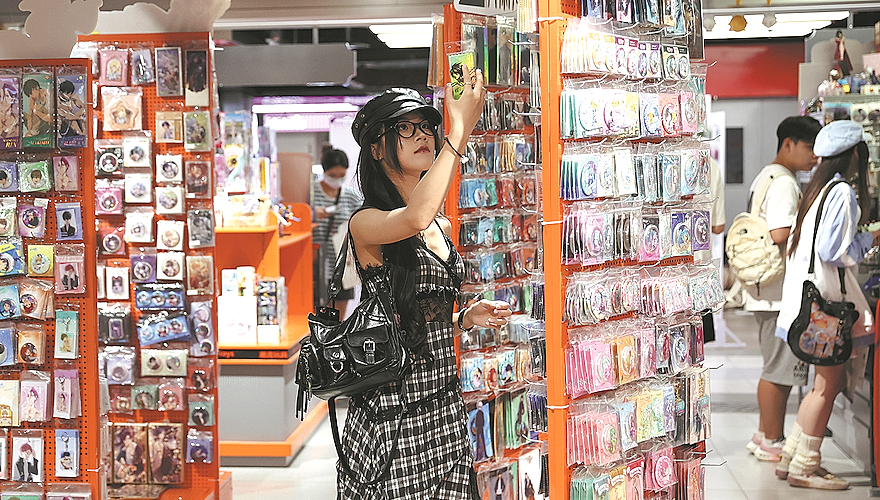
Stepping into the second underground floor of Beijing’s Wangfujing Xiyue Shopping Centre is like entering a teenager’s surreal, subterranean wonderland.
Young people are dressed in lovingly crafted outfits — some with cat ears or animal tails — while others wear cosplay costumes mimicking their favourite anime characters.
Even on a scorching summer’s day when the air hangs heavy, the vibe is electric.
Shops are stocked with anime-themed trinkets and toys, and at the centre of the mall, a bustling market sells collections of tin badges, cards, acrylic figurines and other memorabilia.
Eager shoppers search for their favourite merchandise, and they often celebrate with a squeal of delight when they find a coveted or limited-edition item.
These beautifully designed anime-themed products, known colloquially as gu zi (a homophone of the English word “goods”), are licensed by the producers of anime and games. Some are sold in blind boxes, with prices ranging from 12 (RM7.40) to hundreds of yuan.
However, to enthusiasts these gu zi are more than just collectibles. Acquiring them is a lifestyle that allows them to express their identity, taste, and also make emotional connections. The act of buying these items is fondly referred to as “eating gu”.
Even amid this riot of colour and finery, 16-year-old Qi Li stands out.
The cosplayer, who wears makeup, wigs and costumes, draws her inspiration from the character Kenma Kozume in the popular Japanese anime and manga series Haikyu!! which revolves around a volleyball team.
As she walks around Ciyuan Xiagu, one of the most popular gu zi outlets in the mall, other shoppers stop her and ask to take selfies.
“I often come here because the gu zi are updated frequently,” said Qi Li, as she explains the emotional joy the items bring her, especially when she returns to her cosy room adorned with her tiny treasures after school.
“I often change my costumes and sometimes I make them by myself,” she said.
“It takes me about 40 minutes to do the makeup. When I finish and stand in front of the mirror, I feel like I’m bringing the character alive.”
Qi Li said she loves going to gu zi shops dressed as her favourite characters, and feels proud and confident when people ask to take selfies with her.
She is a big fan of ACG (Anime, Comic, and Games), and said that her mother supports her hobby and often drives her to digital entertainment and gaming expos such as ChinaJoy, one of the biggest ones in the country, “as long as I finish my homework”.
Retail phenomenon
The rapid sales growth of these specialised goods is an indication of the purchasing power of the tech-savvy younger generation.
Since May, topics like “Gu zi shops reviving old malls” have been trending online, bringing the sales phenomenon to the attention of the public.
“This year, in particular, gu zi shops are becoming increasingly prevalent in shopping malls around the country, from first-tier cities to second, even third-tier cities,” said Beijing native, Xue, the co-founder and co-owner of Ciyuan Xiagu, who asked only his family name be used.
“Locations such as Beijing’s Wangfujing Xiyue Shopping Center, Shanghai’s Bailian ZX Creative Plaza, and Wuhan’s Trend Box X118 have undergone transformations, dedicating entire floors or even entire buildings to these stores and cultural spaces,” said the 45-year-old, adding his shop had experienced a surge in sales since May.
Xue, who studied and lived in Japan and previously worked for a Chinese toy company, is a veteran of the anime world.
“To enter this industry, first, you have to genuinely like it. Second, you need to understand its nuances. If you don’t know anything about anime and how it works, how can you find good suppliers?” he asked.
For many anime enthusiasts, collecting merchandise is an integral part of their fandom experience, he said.
“Building an impressive anime merchandise collection not only allows fans to express their love for their favourite characters and series, but also provides a sense of connection to the characters and stories they hold dear,” Xue said.
He launched Ciyuan Xiagu in December 2023 with three friends who share the same passion.
“The mall is one of the first in Beijing highlighting shops pivoting to fit the demands of a digital age. It has become one of the most popular destinations for gu zi lovers,” he said.
While facing competition from online sales, Xue said Ciyuan Xiagu opened its second shop in Chongwenmen in downtown Beijing. A third shop will be launched this October in Xidan, another major commercial area in the capital.
Different from traditional figurines and action figures, gu zi primarily appeals to high school and university students, said Xue’s friend Liu, another co-founder and co-owner of Ciyuan Xiagu, who also wanted to only use his family name.
Little treasures
‘Drawing’ cards are a gu zi item popular with young enthusiasts. They cost as little as 5 yuan (RM3) and come in “blind “packs containing five to 10 different character cards.
Liu said their affordability and the uncertainty of not knowing what is inside the pack until it is opened and cards are drawn, make them attractive to younger children.
“I once saw a very cute, little boy coming to our shop. He gave me 5 yuan for a pack of cards, containing his favourite characters from My Little Pony (anime),” said Liu.
Children often gather in the mall to show and exchange their cards.
“They skip a cup of milk tea and use the money to buy cards. It’s a new way of communicating among young children,” he said.
Pins and cards are also used to decorate “ita” bags, which are usually covered with badges and dolls to showcase a favourite anime character.
However, some of the rare cards can sell for thousands of yuan per pack, leading to parents and teachers being concerned about youngsters becoming obsessed with them.
“Banning them may not be the best solution as anime-themed cards often serve as popular conversation topics among children,” Liu Bo, a researcher at Zhenhai District Education and Science Institute in Ningbo, Zhejiang province, told China Education Daily.
“It is important for parents and educators to offer proper guidance, empathise with the children, and explain the commercial logic involved,” Liu said, adding the industry needs to be regulated.
Rita, 19, from Yichun city, Jiangxi province, was introduced to gu zi by her high school classmates, when they took her to shop in a stationery store.
She was hooked, and bought cards and stickers with her favorite anime characters on them.
After she came to Beijing in September to study Portuguese at China Communication University, Rita learned more about gu zi culture thanks to her new classmates.
Her preference is for sports anime featuring strong characters and “hotblooded plots”.
“When I go to gu zi shops and buy gu zi, it feels like meeting my friends from the 2D world in the 3D world,” she said, adding she loves buying small items such as key chains and badges, and putting them on her bags.
Before traveling she locates the gu zi shops in the cities that she and her friends want to visit.
“Other destinations, such as restaurants and tour sites, are all planned based on the locations of gu zi shops,” she said.

Not just for kids
Yu Yu, 20, loves idol anime, which involves stories about the main character training, rehearsing, competing, and improving themselves to succeed.
The genre combines well-animated choreography and memorable songs. The first idol anime she read was Aikatsu! when she was about 10 years old.
She travels to Japan to visit gu zi shops, an experience she describes as being like “a mouse falling into a jar full of grains”.
“I stay in the shops all day long, searching for gu zi of my favourite characters,” said Yu Yu, who spends about 2,000 to 3,000 yuan per month on buying gu zi.
Yu Yu’s mother, who was born in 1981, shares her daughter’s passion for anime.
“When she (my mother) was a child, she also loved reading comic books, just like me. So, I am very lucky that she supports my hobby and shares what I love,” she added.
Song Shuang, owner of a gu zi shop in Beijing’s Huaxi Live mall in Wukesong, said having a tangible item gives enthusiasts a reason to communicate with people who share the same interest.
Young people who grew up with the internet and anime culture, not only have spiritual support but also a way to socialise, said Song, whose shop has a space where customers can sit down, chat and play games.
Song, 37, is a Beijing native, and grew up reading comic books and watching cartoons.
She said the number of gu zi enthusiasts is not only vast, but the pastime spans a wide range of ages, including herself. However, she isn’t worried about being seen as immature.
“For adults my age, we didn’t have as many gu zi products as today’s young people. But we do have our own favourite anime characters,” she said.
“Now, we are financially independent and able to buy the things we like.”
In August 2023, Song opened her first shop, Ciyuan Jihua, in Beijing’s Drum Tower area, an old neighbourhood renowned for its hutongs and courtyards.
She also helps organise events for anime fans. In March, about 500 people gathered in her shop to celebrate the birthday of their favourite character, Wu Xie from The Grave Robbers’ Chronicles, a popular Chinese anime based on a well-known novel.
“For individual operators, running a gu zi shop is more akin to managing a community centred around shared interests,” she said.
“Shop owners must have a deep passion for anime culture to navigate the complexities of sourcing, distribution, and community engagement effectively.”
Profitable hobby
When he was still in high school, the parents of 24-year-old Wang Gefei used to worry that their son’s obsession with ACG would affect his behavior.
Despite their concern, Wang graduated from Dalian University of Foreign Languages in 2023 with a major in Japanese.
“My hobby inspired me to choose the major and my parents, who are both civil servants, felt relieved,” he said.
However, his recent decision to open his own gu zi shop again worried his parents.
Early this year, he launched his first shop, Jiju Chaowan or Super Toy, in his hometown of Dalian in Liaoning province.
He now owns three shops in Dalian, which has reassured his parents he can develop a career based on his hobby.
Wang believes the rise in the popularity of anime-themed stores is linked to the widespread dissemination of anime culture.
Students from middle schools to universities are the main consumer group, and they have contributed significantly to the trend through their increased purchasing power and diverse cultural demands.
The widespread use of social media and online platforms has also made it easier to promote and sell anime-themed merchandise, Wang said.
Teenagers use social media to stay informed about the latest anime-themed products and events, participate in discussions, and share their interests.
The huge demand, diverse product categories, and robust supply, have given rise to price competition as well as a large market for second-hand gu zi, he added.
Some enthusiasts can earn a stable income by reselling second-hand merchandise.
“For the young people, these things are their spiritual nourishment. They’re cultivating financial acumen through this hobby, which I find quite positive,” Wang said.

ADVERTISEMENT
ADVERTISEMENT








































